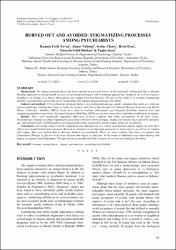Burned out and avoided: Stigmatizing processes among psychiarists

Göster/
Erişim
info:eu-repo/semantics/openAccessTarih
2020Yazar
Yavuz, Kaasım FatihNalbant, Ahmet
Ulusoy, Sevinç
Esen, Betül
Burhan, Huseyin Sehid
Kara, Tuğba
Üst veri
Tüm öğe kaydını gösterKünye
Yavuz, K. F., Nalbant, A., Ulusoy, S., Esen, B., Burhan, H. S. ve Kara, T. (2020). Burned out and avoided: Stigmatizing processes among psychiarists. Psychiatria Danubina, 32(Suppl 4), 463-470.Özet
BACKGROUND: The stigma of mental illness has been reported as a serious barrier in lives of people with mental illness. Besides blocking admission to mental health services, it was found associated with terminating appropriate treatment. As well as relatives, neighbours or friends, it is shown that patients face stigma from psychiatrists. The aim of this study is to evaluate stigmatizing attitudes of psychiatrists and to find out its relationship with burnout and psychological flexibility. SUBJECTS AND METHODS: 256 psychiatrists all along Turkey were participated and age, gender, duration that spent as a clinician and psychotherapy training have been recorded. Acceptance and Action Questionnaire-II, Maslach Burnout Inventory and Mental Illness: Clinicians' Attitudes (MICA) Scale were used to evaluate participants' psychological flexibility, burnout level and stigmatizing attitudes respectively. Structural Equation Modelling (SEM) was used to assess direct and indirect influences on stigma. RESULTS: There were statistically significant differences between residents and senior psychiatrists in all three scales. Psychotherapy training was found significantly associated with lower levels of stigma. Stigma was found to be predicted by duration, age, and burnout levels. In SEM analyses psychological flexibility was found to predict stigma indirectly via burnout. CONCLUSION: Increasing contact with the stigmatized and education are two widely used methods against stigma. In years their effects were found limited and temporary. Burnout in clinicians is an important parameter in many aspects as well as its relation with stigma. There are limited data to decrease burnout in psychiatrists. There are some evidence that shows Acceptance and Commitment Therapy is effective to decrease burnout and stigma in clinicians. In the means of additional ways when dealing with stigma, Acceptance and Commitment Therapy can be a powerful tool while it targets to increase psychological flexibility.

















